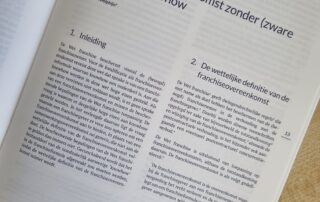Google AdWords: a hot item
Trademark law, trade name, franchise knowledge center, franchise expert, restyling, franchisees
The Internet, as everyone knows, has become one of the most important marketing mechanisms. The search engines play an extremely prominent role in all of this, with Google leading the way. To rank “high” in the search engines, a distinctive domain name is important, as well as all kinds of secondary activities, often summarized under the heading of “search engine optimization”. For some time now, the means of Google AdWords campaigns have also become available, which is enjoying increasing popularity.
For those who are not yet familiar with the system: a specific word is purchased from Google and every time a Google visitor enters that word as a search query, a short advertisement appears above or to the right of the normal search results, containing a link to the website of the advertiser. Google only needs to be settled when the ad is actually clicked by a visitor. All in all, an extremely ingenious and modern system to get the attention of Internet users. Naturally, this also applies to franchise organisations.
When using Google AdWords, however, a number of things should be taken into account. So much so that in the past year several high-profile legal proceedings have been conducted, both at home and abroad. There is a thin dividing line between what is and what is not allowed, with a fixed starting point that everyone can use any word he or she wants as an Adword, where in specific situations action can be taken against that use by a party that believes rights to that word. That could be the person who uses that word as a trade name. This can of course also be the person who has registered the word as a trademark. The latter in particular enjoys fairly far-reaching protection under European and national trademark law, especially when the trademark is being used by a competitor in the same industry. In the context of the subject of this article: if a party with a Google AdWord deliberately tries to link up with the well-known trademark, the trademark owner can stop that AdWord campaign. The protection under a trade name, not a registered trademark, is slightly less far-reaching: trade name infringement must be demonstrated and this only occurs when the third user of the word runs a business under the contested name and there is therefore a risk of confusion. is. This is a somewhat difficult legal construction, but not impossible.
On August 24, 2011, the Court of Leeuwarden ruled in interlocutory proceedings that the use of a registered trademark by a party other than the trademark holder itself as Google AdWord is not permitted. This is in line with various jurisprudence of, among others, the European Court of Justice. The criterion here is again whether the use of the trademark takes place in the same sector and for the same goods and/or services and if, as a result, the average internet user cannot know whether the relevant goods and services originate from the trademark proprietor or from the infringer, the so-called risk of confusion. In the aforementioned case, the judge in preliminary relief proceedings ruled that this was the case and prohibited the infringement.
The conclusion of all this is that a trademark owner or trade name holder is extraordinary should be on his guard and check regularly that his trademark or trade name is not being infringed, including in the form of Google AdWords. If the titleholder does not do so, then it is all too easy for others to piggyback on the success and reputation of the brand or trade name by means of a Google AdWord. This also applies to franchise relationships. Both franchisors and franchisees must ensure that their advertising, including Google AdWords, does not infringe the trademark or trade name rights of others. Conversely, it is important that both the franchisor and franchisees are at all times concerned about infringement by others. Timely intervention can prevent costly procedures.
Ludwig & Van Dam franchise attorneys, franchise legal advice

Other messages
Continued activities of the franchisee do not violate a non-competition clause
A judgment was recently rendered in preliminary relief proceedings in ...
Car dealer wrongly not a franchisee?
The Franchise Act entered into force on 1 January ...
Suspension of payouts allowed by the franchisor
The District Court of Limburg ruled on 30 March 2023, ...
Franchising is on the rise: ‘There is still a huge amount of room for it in the Netherlands’
An interview with mr. AW Dolphijn about franchise. De Beren, ...
The franchise agreement without (heavy demands on) know-how
In the 2023-1 edition of Contracting magazine, I published a ...
Standstill period violation
On 15 March 2023, the District Court of Noord-Holland, ECLI:NL:RBNHO:2023:2636, ...







